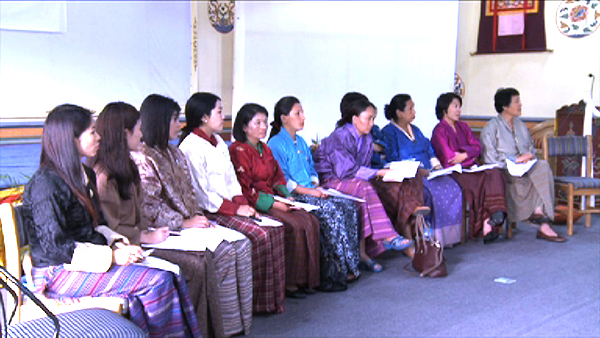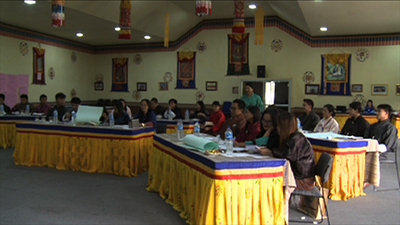 As women representation in elections continues to remain grim, the Bhutan-Network for Empowering Women (B-NEW) is suggesting women quota for elected posts as a temporary measure to promote gender-balanced representation in the parliament.
As women representation in elections continues to remain grim, the Bhutan-Network for Empowering Women (B-NEW) is suggesting women quota for elected posts as a temporary measure to promote gender-balanced representation in the parliament.
The proposals for introducing quota to improve women representation in elections have sparked debates in the past. Some are of the view it would undermine the potential of women, while others think quota system with proper definition and conditions could be a good tool to kick start.
B-NEW says quota as a system or a concept can be a fast track measure to enhance women representation in politics.
“I think globally, if you look at the quota system and how it has worked, out of some 15 or 16 countries that have managed to consistently maintain above 30 per cent women representation in the parliament, at least 11 actually have a quota system,” Phuntshok Choden, B-NEW’s Executive Director, said.
The parties and women candidates too remain divided over the issue. Dasho Dorji Choden of the People’s Democratic Party (PDP) is for it.
“Quota system could be a useful tool to just kick start and to create that mass of women in political career,” she said.
“But it should not be for the sake of quota as in terms of numbers. I think we can still equate with the same capability, educational background and experiences as male colleagues. If you rate at that par and have the quota system, I feel that this can be a good instrument,” Dasho Dorji Choden added.
Druk Nyamrup Tshogpa’s (DNT) Dorjee Wangmo shared the view.
“I feel the quota system can be a good tool until women’s participation in politics pick momentum or until women’s participation in politics is well perceived by the public,” Dorjee Wangmo said.
Lily Wangchuk, the Vice President of Druk Phuensum Tshogpa (DPT) , too, is in favor of introducing quota as a special temporary measure.
“In the context of Bhutan, given the fact that we have both national and international obligation to bridge the gender gap in all sphere, if we are genuinely committed to this pledge that we made internationally and nationally, I think there is a need for some special temporary measure,” Lily Wangchuk said.
“We have also made a pledge that by 2030 we will work towards Planet 50-50. Today, we are only 12 years away from achieving this goal and we are nowhere close to achieving the target of 50-50 in the political sphere at the rate we are moving right now. So, definitely I believe some amount of special temporary measure will greatly help address the current barriers that women face,” she added.
Others are not so much in favor of quota for women.

Bhutan Kuen-Nyam Party (BKP), for instance, is not so welcoming of the idea.
“There is a need for political participation from women and BKP has made every effort to encourage women participation. We have a policy to encourage 30 per cent women representation, but that doesn’t mean it’s quota reserved for women. What we encourage most is competency, knowledge, experience and commitment,” Sonam Tobgay, the Vice President of BKP, said.
Even the ones who spoke in support of quota as temporary measure have certain misgivings about it.
“On the other hand, I still feel that it maybe too early because it’s just the third round of election. Many old democracies in the world are still struggling with poor women representation and maybe politics is not the choice of women, so I have this mixed feeling,” PDP’s Dasho Dorji Choden said.
“A woman coming forward to join politics willingly and through democratically elected process is more meaningful and adds value to her participation,” DNT’s Dorjee Wangmo said.
“She who has the trust of the people in her strength and capability and who can garner votes because of her potential will be valued. Looking at women’s participation in politics from that perspective, I don’t think there is a need to have quota system,” she added.
The National Conference on Women in Governance, Leadership and Politics in Bhutan 2017 saw discussions on introducing quota for women. But the discussions were overshadowed with negative regional experiences and examples.
But B-NEW firmly believes that quota does work if it’s implemented under proper legislation, legal framework and policy.
“For instance in the neighboring regions, strong party leaders tend to nominate women irrespective of their potential and capability to represent the citizens. They just nominate family members or friends, which has then left a bitter taste because these women eventually do not represent the masses and they do not have the necessary experiences and qualifications. They really become tools for the men to do things they have always done and they don’t really represent women’s view,” B-NEW’s Phuntshok Choden said.
The conference set a goal of ensuring 30 per cent women candidature in the upcoming parliamentary elections from political parties. But meeting that target remains a far-fetched dream with only 19 women standing for the primary round of the 2018 National Assembly election.
The conference also introduced a quota system of a Bhutanese model, which was presented to the cabinet but was not approved.
“In this case, it’s being suggested that from every constituency there should be a male candidate and a female candidate and the female candidate should be equally searched, vetted and screened to be equally competent and capable through the same criteria that you would apply to the male, and then the voters are presented with a male candidate and a female candidate,” Phuntshok Choden said.
Poor women representation in parliament is an issue in almost every part of the world. The global average of women in parliament is 20 per cent. The highest percentage of women in parliament Bhutan saw was in 2008 at 14 per cent.












